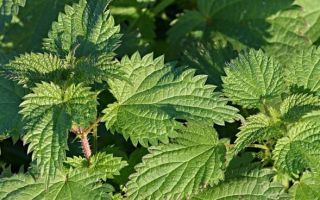Stinging nettle is a perennial herbaceous plant with a long creeping rhizome.
Description and composition
The stem and leaves of the plant are covered with stinging hairs, which, when in contact with the skin of humans and animals, pierce it and release a liquid (formic acid), which causes a strong burning sensation.
Leaves and roots are used for treatment.
Blooms from June to September.
Leaves should be collected during flowering and dried in a well-ventilated area, protected from sunlight.
Nettle contains
- vitamins C, K, B1, B2, carotene,
- tannins,
- glycosides,
- flavonoids,
- alkaloids,
- phytoncides,
- choline,
- organic acids - formic, oxalic, succinic, fumaric, lactic, citric, quinic,
- phenolcarboxylic acids – gallic, caffeic, ferulic, coumaric, silicic, acetic,
- nicotine,
- acetylcholine,
- histamine,
- starch,
- coumarin,
- gums, sterols, proteins, fats,
- resinous substance
- trace elements - magnesium, copper, zinc, potassium, calcium, chromium, iron, manganese, aluminum, vanadium, silene, strontium, lead, boron and others.
Properties of nettle
Since ancient times, a water infusion of nettle leaves has been used to stop bleeding -
- intestinal,
- hemorrhoidal,
- renal,
- pulmonary,
- uterine.
- In medicine, an extract from nettle leaves is used, which is prescribed for
- intestinal bleeding,
- fibroids,
- when healing processes slow down after childbirth.
The liquid extract also has diuretic, antifever and anti-inflammatory effects.
Nettle leaves are used as a milk extractor for lactating women.
In addition, it is part of the drug allohol, which is recommended for acute and chronic diseases of the liver and biliary tract,
chronic constipation , and cholelithiasis.
Research has also been conducted on the effect of nettle on diabetes. Animal experiments have shown that a decoction of the leaves reduces sugar levels in the blood and urine.
It has been established that nettle increases the percentage of hemoglobin and the number of red blood cells in the blood. This confirms the old belief that it is a good “blood cleanser”. Therefore, it is extremely useful for blood diseases and is used to treat boils, acne, lichen and other skin diseases.
Nettle herb is also used in folk medicine
- for dysentery,
- hemorrhoids,
- metabolic disorders,
- dropsy,
- gout,
- diseases of the liver and gall bladder.
Externally, the decoction is very effective for strengthening hair. It is necessary to rinse your hair with it after washing.
In ancient herbal books, nettle is mentioned as an anti-cancer agent.
A decoction of the roots is used for treatment
- hemorrhoids,
- swelling of the legs,
- boils,
- asthma,
- as a heart remedy.
An infusion of flowers is effective for coughing with phlegm and suffocation.
In the spring, when there are no fresh vegetables yet, and the body has a special need for vitamins, cabbage soup or borscht is cooked from young nettle leaves.
Contraindications
You should not take nettle when
- pregnancy,
- atherosclerosis,
- hypertension,
- myocardial infarction,
- thrombophlebitis,
- increased blood clotting,
- gynecological diseases of a tumor nature,
- in large doses may increase the tendency of kidney stones.
How to cook?
To prepare the infusion, brew two tablespoons of dry leaves with 1 cup of boiling water, leave for 1 hour, strain. Drink half a glass 2 times a day.
The decoction is prepared as follows: pour 1 tablespoon of dry leaves with 1 glass of boiling water, boil for 10 minutes over low heat, cool and strain. Take 1 tablespoon 4 times a day.







